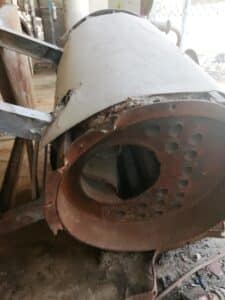Better Work Jordan partnered with a legal expert in labour affairs to release a study entitled “The Regulatory Framework For Using Heavy Machinery in Jordan” to analyze existing policies and identify amendments needed.
3 April 2018

Amman – Whether mechanical or electrical, industrial machinery is considered a major risk-contributing factor in the workplace. It is therefore the responsibility of employers to ensure the health and safety of their workers and to provide safe working environments for their staff. The employee, on the other hand, is responsible for their handling of the machinery, interactions with other staff and their working methods, in addition to compliance with workplace safety procedures.
Employers are held accountable for ensuring that their workplace practices are in-line with relevant national and international regulations and standards on workplace safety. As such, there is an ongoing need for decision makers and stakeholders to identify and list necessary mechanisms to ensure employee safety. This is especially true in the case of operating heavy machinery where compliance with and enforcement of national laws and regulations is the only guaranteed way to ensure safety.
In response to severe accidents caused by boiler rooms in 2017 to workers in Jordan, Cambodia, Pakistan, and Bangladesh, Better Work Jordan released a study titled “The Regulatory Framework For Using Heavy Machinery in Jordan,” which aims to understand Jordan’s present national legal framework, especially in the garment sector, and put forward recommendations for resolving identified gaps.
Jordan has several laws that focus on employee health and safety. Yet ensure the effectiveness of the current framework there is a need to go into specifics. Jordanian Labor Law does not, for example, contain explicit provisions specifying the requirements, characteristics, and technical foundations of heavy industrial machines, with the exception of Article 43, which contains a clause on the prevention and safety of the industrial equipment, machines, and workplaces. With equipment and machines such as boilers, elevators, electrical, and hydraulic machines or other machines posing a serious safety risk in the case of misuse, there is a particular need for the law to provide additional detail.
The study addresses three different entities, namely; the Ministry of Labor (MoL), Jordan Standards and Metrology Organization (JSMO), and the Centre of Accreditation and Quality Assurance (CAQA).
The proposed legislative framework generated recommendations to the MoL on occupational safety and health instructions on heavy machinery and equipment in accordance with the labor law, highlighting details such as a clear definition for the term ‘heavy machinery’, licensing and registration, and the training of operators and inspectors.
The suggested framework further highlights recommended responsibilities for MoL such as incorporating instructions that deem them the authority to inspect safety and occupational health in institutions’ licensing procedures, mentioning the precautionary and protection means from dangers of using machinery and equipment in workplaces, and mentioning duties and responsibilities of employers, workers, manufactures and suppliers.
To ensure the seamless and efficient execution of the suggested amendments, the study recommends identifying a recognized system for training and certification for examiners, inspectors, and operators of heavy machines and obtaining accreditation.
The proposed legislation for JSMO implies that they should initiate and approve binding technical regulations and standards to institutions, especially for heavy machinery and equipment. The recommendation further stipulates that JSMO should determine the required specifications for heavy machinery and equipment through established and recognizable international standards.
Recommendations were made to CAQA to address and rectify the occupational standards for examiners, inspectors, and heavy machinery and equipment operators.
“Whether a veteran or a new employee, whether an established factory or a start-up, the issue of safety is vital. By reviewing existing practices and laws and making the proper necessary adjustments, employees, employers, and stakeholders can operate risk-free,” shared Hamadah Abu Nijmeh, legal expert on labor affairs and the author of the new study.
The report will be presented to national stakeholders in April and shared with the Government of Jordan shortly thereafter.